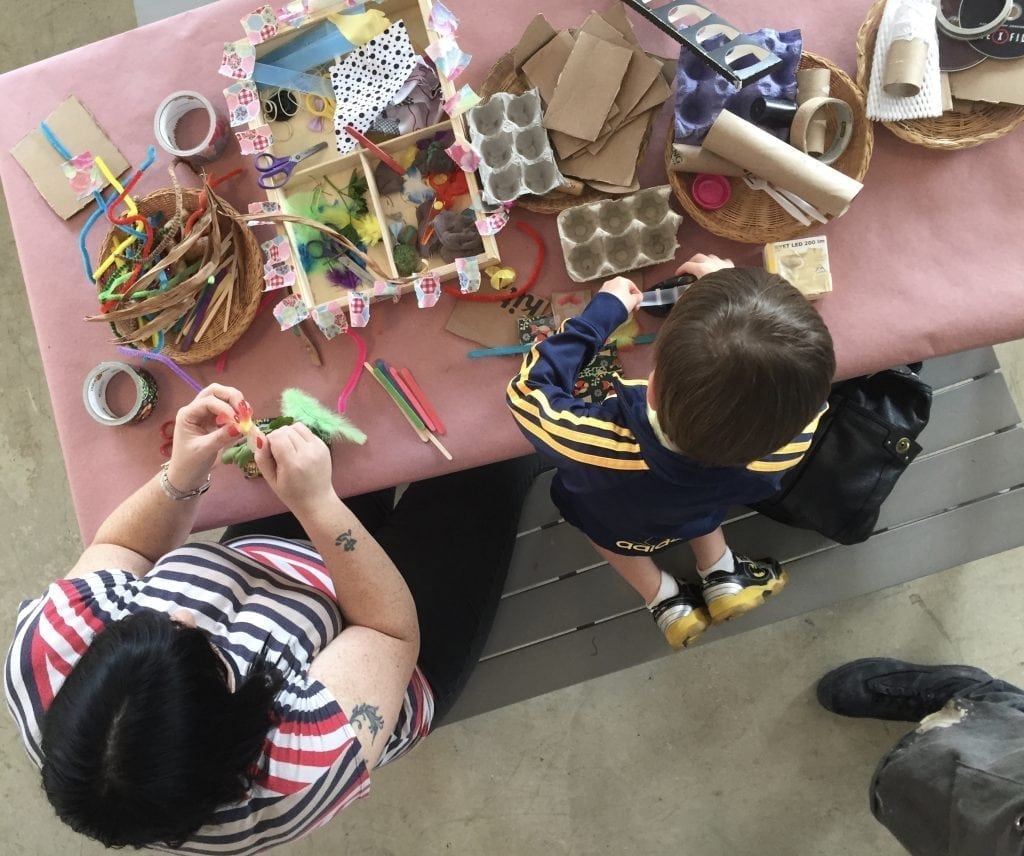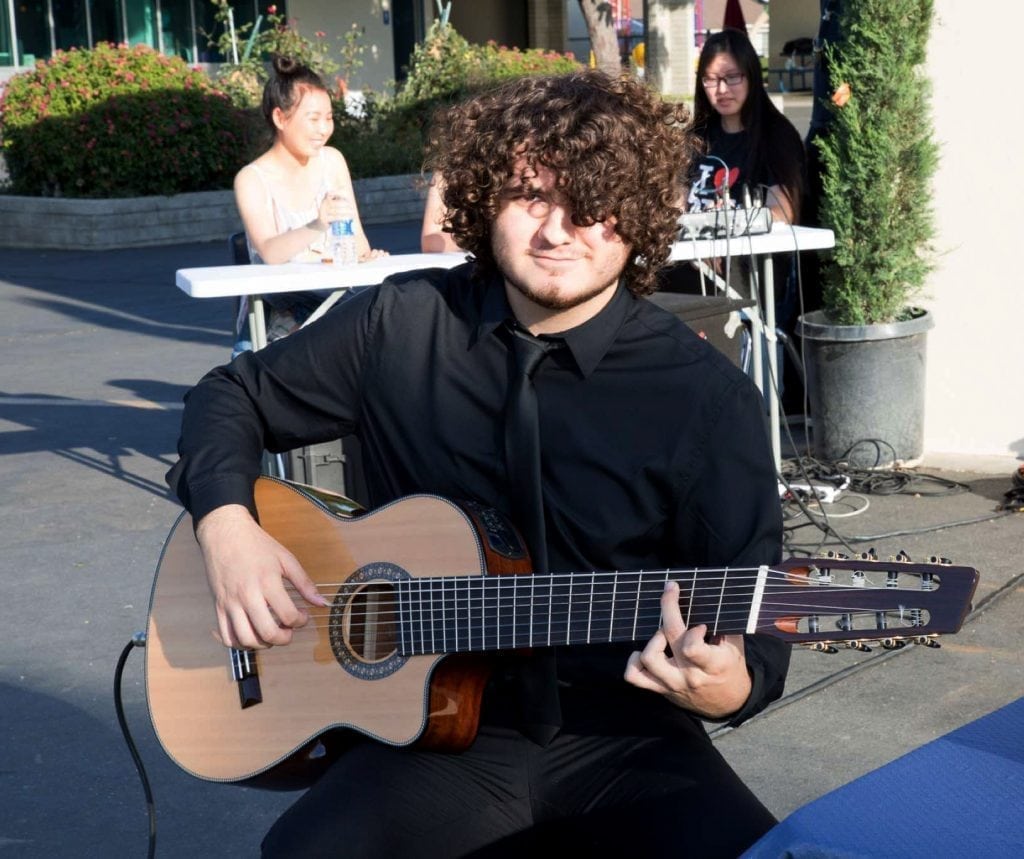
The Lab for Hands-On Learning and Exploration in Eagle Rock offers in-person materials-based activities for homeschool students and after-school enrichment. PHOTO COURTESY THE LAB
As kids settle into the new school year, education options continue to evolve. Students in and around L.A. have many choices, from online schools and classes to homeschooling programs and traditional schools that offer online components. Which of these might be right for your family? Which students benefit most from nontraditional education, and what challenges should families be ready to tackle? Here are some of the basics.
Reasons To Go Nontraditional
There are many reasons families opt out of traditional public- or private-school options. Many students who have fallen behind academically choose online schools to help them catch up, and some get their high school diplomas online, according to San Marino High School counselor Lisa Perry.
Michael Kraft, vice president of online-education company K12, which offers private school and tuition-free public school programs, says his programs are great for students who may be struggling. “A struggling student may be one who has failed certain courses, is bored or turned off by school, misses school days, feels unsafe at school, or perhaps has received suspensions or been left back,” he explains.
Conditions on traditional campuses can also drive families toward nontraditional options. “More and more, we are seeing families with concerns about bullying and school violence looking for online or homeschool,” says John Edelson, founder of online homeschool curriculum Time4Learning.
Beverly Hills-based college admissions counselor Danny Ruderman (who has worked with Snapchat CEO Evan Spiegel and actors Don Cheadle and Dylan McDermott) says “students who may need to learn material in a different way than the traditional classroom-lecture format offers, those who might need the time and flexibility to pursue an outside interest such as a sport or acting, or those whose families simply want the flexibility for their children to get ahead or travel or learn information not taught in textbooks” are also good candidates for nontraditional schooling.
Military families looking for a stable educational program and those with kids who are gifted and under-challenged might also seek out online and other nontraditional options.
But Kraft says online programs can work for every type of student, from high achievers to students with learning disabilities. “Online school gives students the opportunity to advance at a pace that is right for them,” he says. “Advanced learners can progress quickly, and those who find concepts more challenging can take the extra time they need.”
That might be one reason the popularity of homeschooling continues to climb. “Over the past decade, the mainstream perception of homeschooling has changed dramatically. Those who would never have homeschooled in the past are now embracing this method of education,” Edelson says, noting that nearly 3.5 percent of school-age children are currently homeschooled, according to the National Center for Education Statistics.
Which kids will do well in these programs? Kids who are committed to making it work. “To be a successful nontraditional student, a child would need to be quite self-motivated, curious, able to work independently and disciplined,” says Perry.

Ryan Feliciano is a senior at the Dr. Doug Sears Learning Center, where learning is self-paced and school, home and community interaction is the goal. PHOTO BY JERRY JAMBAZIAN
Exploring Your Options
If your student is one of those independent, self-motivated types – or if your family finds that online schooling might make life easier – check out the many options available in the L.A. area.
Perry says the most prestigious and well-known online high school is likely Stanford Online High School. “It’s really difficult and challenging,” she says, citing BYU Independent Study, Laurel Springs and National University as other well-known online high schools.
Ruderman notes that Stanford Online High School students do well in terms of college admissions, and echoes Perry in calling out BYU online. He also says he has had students take classes at Fusion Academy, a one-to-one middle- and high-school program with several area campuses, with good results. He says K12 is well known as well.
The K12 curriculum is used in more than 2,000 schools and school districts. In the L.A. area, K12 is found in iQ Academy California-Los Angeles, which is geared toward advanced learners; Insight Schools of California, which helps struggling students get back on track; and one of the nine California Virtual Academies, for students living in L.A. and Ventura counties.
Time4Learning is an online homeschool curriculum for students in kindergarten through grade 12. Edelson says his program stands out because it gives students access to a full year of lessons from day one. “The curriculum itself is student-paced, which enables each individual child to learn at their own level and speed,” he says. Parents have access to automated lesson plans, grading and reporting tools. Kids log into a secure website to access their math, language arts, science and social studies lessons, quizzes and tests. “Students in elementary and middle school are given access to three grade levels: their current grade level, and the grade level above and below,” explains Edelson. This allows them to customize by subject.
Families looking to add enrichment to their nontraditional school plan will find a chance at The Lab for Hands-On Learning and Exploration in Eagle Rock, a year-round homeschool and after-school enrichment center for ages 3-12. “The heart of The Lab’s program is to provide a space where children are free to learn at their own pace, in their own style and in relation to what they hold most meaningful to themselves,” says co-founder Efrim Chiavetta. What does that look like? The center features plenty of materials to help children learn and explore, and adult educators to facilitate when needed. “At The Lab, the academically educational aspects of the program are incorporated into the art projects, pretend play and explorations that children choose freely throughout the day,” says Chiavetta. The center has also partnered with Inspire Charter School, serving as one of the school’s specialty programs.
For high school students who want a nontraditional school program in an on-campus setting, there are schools such as Dr. Doug Sears Learning Center and Temple City Alternative School, which are both part of the adult, alternative and community education programs in the Temple City Unified School District. “The program is nontraditional, self-paced and utilizes authentic assessment to create a life-skills learning experience which assumes more of students, school, home and community interaction,” says Principal Bob Westgate.
Making It Work For You
On-campus programs and in-person enrichment can be keys to overcoming one common challenge of nontraditional schooling: socialization. “We have had children at The Lab that, in their quiet home environment, could do very complex academic work, and at The Lab they were clearly working on emerging social skills and making connections with peers,” says Chaivetta.
Pairing online and real-life experience is key. “Parents should help their children find ways of pursuing their interests outside the computer,” says Ruderman, especially since online curricula are often more flexible in terms of time.
Beyond that, families should be forward thinking and consider how their education plan will be viewed by college-admissions officers.

The K12 curriculum is used in more than 2,000 schools and school districts, and allows students to learn online at their own pace. PHOTO COURTEY K12
If you are homeschooling, pay attention to your curriculum choices. “Parents can look for standards-based curriculum in math, language arts, science and social studies,” says Edelson. “In my experience, homeschoolers often meet or exceed the standards of traditional schools.”
Parents considering online or other nontraditional schools should check out the reputations of these programs. “I would suggest they ask the school about their college placements, as well as contact admissions offices at different colleges and ask how they evaluate a specific nontraditional school,” says Ruderman. He also stresses the importance of tests such as the ACT and SAT to help offset any perception that the coursework your child has completed is sub-par. “One of the keys are a student’s test scores,” he explains. “Since the tests are standardized, if a student from nontraditional school can do well, it can show a college that his or her preparation was good.”
Perry says colleges generally also consider the reason a student has turned to an online program in evaluating that student’s application. “Some students may take online classes if they want to investigate something their high school doesn’t offer,” says Perry. If a high school doesn’t offer linear algebra, for instance, and a mathematically advanced student takes that class online, she says colleges would look favorably on that scenario.
Whether your child wants to get ahead or catch up, study completely online, take an add-on course or follow a self-paced nontraditional program on campus, there are plenty of options available. With a little research, you can find the best fit and customize your child’s education.
Lindsey Hunter Lopez is a former entertainment writer and English teacher and a mom of two.


























